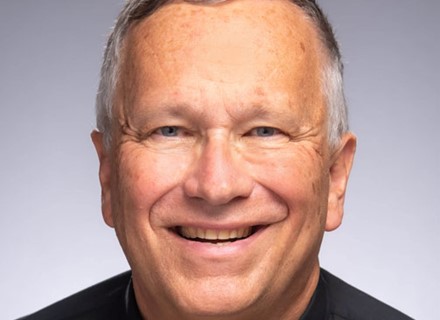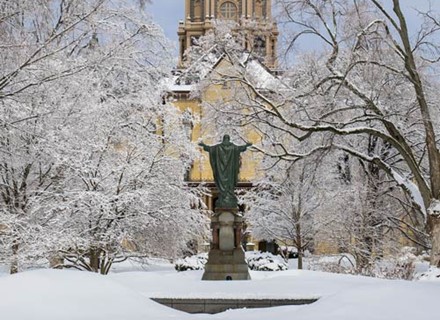Last week, Father Jim Bracke wrote a wonderful guest column about thankfulness for Mendoza Exchange. My message this week is basically to echo his words — to share my and our students’ gratitude for each of you and all that you’ve done toward a successful fall semester. COVID presented us with a “great wave,” and you responded with an even greater commitment to our students and to each other, working even harder to overcome the challenges. Thank you!
Our students have recognized and appreciated your efforts. Please find below some notes of their gratitude:
Paul Chitwood (EMNA ’20): As a long spring of working from home shifted to a long summer of working from home, one of the blessed interruptions to my schedule was a full summer of online course work with my MNA colleagues. While one of the richest parts of the MNA program has been on-campus interactions and relationships during my summers in South Bend, online classes were better than nothing! I was encouraged, enlightened and challenged by my peers, just when I needed it most. The understanding, availability and flexibility of the faculty was also a blessing. I'm wrapping up my degree this month with a deep sense of gratitude that God let me be a part of the Mendoza family!
Ahsan Mohar (MBA ’21): The year 2020 has been difficult not just because of COVID-19, but also because of the stark realization of racial inequality in this country that was lived daily by some but had remained out of sight for many. Over the past few months, some of my peers took the initiative to contribute towards building a more equal and inclusive world, starting with our own college. We have received tremendous support in our journey and are encouraged to see that faculty and staff have committed to prioritizing this topic. While we have gotten positive feedback thus far, there is still a long way to go and we hope that we will continue to find support and action from the leadership at Mendoza in this important journey. Thank you!
Abigail Abel (MSF ’21): At the beginning of the semester, I was worried about starting the Chicago MSF program during the pandemic. I was afraid I would not fully benefit from the program as I would pre/post-pandemic. My worries soon disappeared, and I realized how incredibly blessed I am to be a part of the Chicago MSF 2021 cohort. I did not only hit the jackpot with my fellow classmates, but the Notre Dame professors, Brooke Shannon, Christine Gramhofer, the Student Services team, the Mendoza IT support group and the staff have been phenomenal. 2020 has not been anything but unpredictable, and the MSF faculty and staff have worked tirelessly to make sure our program is as normal as possible and that we feel a part of the Notre Dame family. I will be forever grateful for their hard work and tenacity and will cherish this experience and my Notre Dame family for years to come.
Rory J. Kelly (MBA ’21): Professor Jen Cronin did a great job of gauging class morale and creating a fantastic learning environment in the first module. Jen was very effective in engaging her class, expertly mixing in family stories with class instruction. This created a family environment which led to increased engagement throughout the class. She was adamant that we learn just as much material as if in a normal year, but balanced the reality of the pandemic very well.
Jenna Schiemer (MBA ’21): I am so grateful for all of the efforts from our senior leaders, staff and faculty within Mendoza, and also our campus-wide community, for every ounce of effort that went into ensuring we could be in-person for our courses this year. I recognize that we are one of the few universities to be so fortunate in this time of great uncertainty and hardship for our world, but seeing the Notre Dame community come together in this way has made me even prouder to now belong to this truly one-of-a-kind Irish family.
Dwight Silva (MBA ’21): The Notre Dame family has proven its worth and kindness to me throughout this progression. The genuine support through a bout of illness and thereby having to reschedule my wedding was heartwarming and humbling. My fiancée and I gained a sincere, renewed appreciation for the caliber of the individuals that Notre Dame recruits, instructs and grooms to “grow the good in business” as MBA students. I am indebted to the University.
In this season of Thanksgiving, please know of my deep gratitude to all of you and to God above all for all His grace. I’m also glad to let you know that I’m now fully recovered from COVID except for a lingering mild, dry cough, and that I’m cleared to return to campus. I’m grateful for your prayers and well wishes.
I wish peace, health and joy to you and your loved ones during this holiday time.
In Notre Dame,
Martijn





